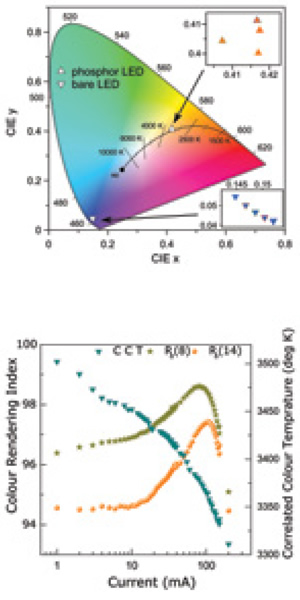 The European project NEWLED (Nanostructured Efficient White LEDs based on shortperiod superlattices and quantum dots), launched in 2012, aims to develop high-efficiency and high-brightness monolithic and hybrid all-semiconductor white GaN-based lightemitting-diodes (LEDs).
The European project NEWLED (Nanostructured Efficient White LEDs based on shortperiod superlattices and quantum dots), launched in 2012, aims to develop high-efficiency and high-brightness monolithic and hybrid all-semiconductor white GaN-based lightemitting-diodes (LEDs).
This €11.8M FP7-IP project involving 15 leading academic and industrial partners from all over Europe is coordinated by Aston University, Birmingham, UK. The NEWLED consortium has been assembled to bring together highly recognised experts from academia and industry ensuring best material and process development supported by expert simulation and perfectly adapted rigorous analytical capabilities.
The principle objective of the NEWLED project is the development of high brightness white LEDs with high colour rendering index (CRI >95) and efficacies of more than 200 lm/W. Along this, the team also investigates advanced packaging to enable effective heat dissipation and light management to realise lifetimes of more than 50k hours. The devices will have immediate applications in automotive, industrial lighting and displays industries. The widespread implementation would reduce global energy consumption by approximately 10% and reduce CO2 emissions by 3 Bn tonnes with consequent economic and environmental benefits.
NEWLED collaborators have played a tremendous role in developing and exploiting a range of challenging and cutting-edge research directions to advance both the physical understanding and the key technology underlying novel light-emitting diodes with superior capabilities. During the project, excellent progress has been made: Novel nanostructures and devices have been designed, fabricated and evaluated by the project partners; detailed theoretical models have been developed, e.g. for the optimal ways of colour mixing providing the optimal emission wavelengths, spectral widths and necessary efficacies of the individual monochromatic LEDs that serve as a guide for the development of high efficacy white LEDs with high CRI. Novel crystal growth approaches are used to develop superior materials that are processed by best-in-class chip processes facilitating optimal current spreading and light extraction.
NEWLED has already delivered significant advances and world record performances in realisation of a new class of LEDs with high capabilities. To date, white LEDs with efficacy of 200 lm/W at CRI of 90 with wallplug efficiency of ~60% have been demonstrated by the NEWLED consortium. The advantage of the use a dual-colour monolithic blue-cyan LED emitting in the 420-480 nm wavelength range with a mixture of green and red phosphors has also been explored to achieve warm-white light emission with correlated colour temperature (CCT) of ~3300K and superior CRI of 98.6 (Fig. 1), thus allowing a reduction of the number of phosphors used for warm white light emission with high CRI.
Fig. 1. (top image) Chromaticity coordinates of a monolithic blue-cyan LED and a phosphor-converted LED with a superior CRI of 98.6; (bottom image) CRI and CCT vs. current of the developed high-brightness white LED.
The obtained results are enormously encouraging and confirm the great potential of the NEWLED technology to enable future development of highly efficient and high-brightness white LEDs

Contact details:
Website: www.newled-fp7.eu
Prof. Edik Rafailov
Email: e.rafailov@aston.ac.uk
Mr. James Clayton
Email: newled@aston.ac.uk